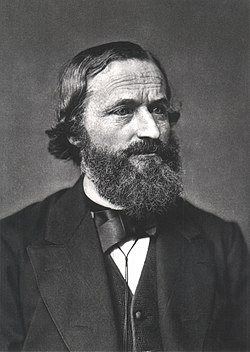Gustav Kirchhoff
| Gustav Kirchhoff | |
|---|---|

Gustav Kirchhoff
|
|
| Born | Gustav Robert Kirchhoff 12 March 1824 Königsberg, Kingdom of Prussia (present-day Kaliningrad, Russia) |
| Died | 17 October 1887 (aged 63) Berlin, Prussia, German Empire (present-day Germany) |
| Residence | Prussia/German Empire |
| Nationality |
Prussian (until 1871) German (after 1871) |
| Fields |
Physics Chemistry |
| Institutions |
University of Berlin University of Breslau University of Heidelberg |
| Alma mater | University of Königsberg |
| Doctoral advisor |
Franz Ernst Neumann Otto Hesse |
| Notable students |
Loránd Eötvös Edward Nichols Gabriel Lippmann Dmitri Ivanovich Mendeleev Max Planck Jules Piccard Max Noether Heike Kamerlingh Onnes Ernst Schröder |
| Known for |
Kirchhoff's circuit laws Kirchhoff's law of thermal radiation Kirchhoff's laws of spectroscopy Kirchhoff's law of thermochemistry |
| Notable awards |
Rumford medal (1862) Davy Medal (1877) Matteucci Medal (1877) Janssen Medal (1887) |
Gustav Robert Kirchhoff (12 March 1824 – 17 October 1887) was a German physicist who contributed to the fundamental understanding of electrical circuits, spectroscopy, and the emission of black-body radiation by heated objects.
He coined the term "black body" radiation in 1862, and two different sets of concepts (one in circuit theory, and one in spectroscopy) are named "" after him; there is also a Kirchhoff's Law in thermochemistry. The Bunsen–Kirchhoff Award for spectroscopy is named after him and his colleague, Robert Bunsen.
Gustav Kirchhoff was born in Königsberg, Prussia, the son of Friedrich Kirchhoff, a lawyer, and Johanna Henriette Wittke. He graduated from the Albertus University of Königsberg in 1847 where he attended the mathematico-physical seminar directed by Carl Gustav Jacob Jacobi,Franz Ernst Neumann and Friedrich Julius Richelot. In the same year, he moved to Berlin, where he stayed until he received a professorship at Breslau. Later, in 1857, He married Clara Richelot, the daughter of his mathematics professor Richelot. The couple had five children. Clara died in 1869. He married Luise Brömmel in 1872.
Kirchhoff formulated his circuit laws, which are now ubiquitous in electrical engineering, in 1845, while still a student. He completed this study as a seminar exercise; it later became his doctoral dissertation. In 1857 he calculated that an electric signal in a resistanceless wire travels along the wire at the speed of light. He proposed his law of thermal radiation in 1859, and gave a proof in 1861. He was called to the University of Heidelberg in 1854, where he collaborated in spectroscopic work with Robert Bunsen. Together Kirchhoff and Bunsen discovered caesium and rubidium in 1861. At Heidelberg he ran a mathematico-physical seminar, modelled on Neumann's, with the mathematician Leo Koenigsberger. Among those who attended this seminar were Arthur Schuster and Sofia Kovalevskaya. In 1875 Kirchhoff accepted the first chair specifically dedicated to theoretical physics at Berlin.
...
Wikipedia
